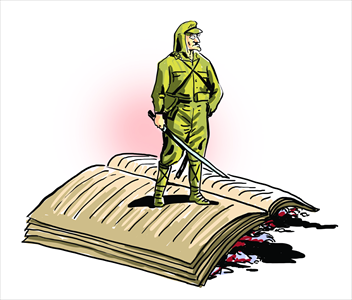HOME >> OP-ED
Textbook arguments can’t change history
Source:Global Times Published: 2013-7-25 22:28:01

Illustration: Liu Rui/GT
Recently, a discussion whether to use the term "Japanese rule" or "Japanese occupation" in Taiwan high school history textbooks has divided Taiwanese scholars.
Taiwan leader Ma Ying-jeou, said he had been using the term "Japanese occupation" since childhood, but was not opposed to others using "Japanese rule."
However, Taiwan's "Executive Yuan" issued a statement on Monday, saying the historical period would now be referred to as "Japanese occupation" in all government agencies, according to Taipei Times.
Representatives of the Taiwan Association of University Professors, a pro-independence group, urged the Taiwan authorities to maintain the wording "Japanese rule" in high school history textbooks to describe the Japanese colonial era in Taiwan, saying that the term "Japanese occupation" only reflects mainland history.
What they cannot accept is that the term "Japanese occupation" indicates that Taiwanese history is a part of Chinese history. According to these professors' explanation, the Japanese ruling period was legal since they regard the Treaty of Shimonoseki as part of international law, as Taipei Times reported.
Their real intention is to build up the image of Japan's colonization of Taiwan, even praising Japan's modernization drive on infrastructure during the ruling period by stirring up textbook wording disputes.
One of their goals is to highlight the positive side of Japan's colonization, serving as a contrast to their perceived backwardness of China.
The textbook wording dispute has been given excessive political meaning, which is the wrong way to proceed. Whether the term "Japanese rule" has a pro-independence meaning when describing Japan's invasion history in textbooks should only be discussed as an academic issue.
However, though textbook wording is fundamentally not a political issue, the content of history textbooks can reflect the political standpoint of an administration.
Take Japan as an example, since the 1980s and the 1990s, Japan has diluted detailed descriptions of Japan's invasion actions during WWII in its textbooks. The few publishers who do use the term "invasion" in textbooks are hounded by right-wing groups.
In contrast, textbooks in Germany make open apologies for the country's atrocities during WWII.
The progress depends on self-examination. Germany's textbooks have taken the right attitude, which is worthy of respect.
As for Taiwan's history during WWII, members of pro-independence groups who say the public bears polarized opinions toward Japan's past invasion are looking down upon Taiwanese people.
According to their understanding, there are still a certain number of Taiwanese citizens who deny Japan's past invasion.
However, based on my 20 years teaching in Taiwan, young Taiwanese including undergraduates never confuse their attitudes about Japan's past invasion with their impressions of Japanese citizens. There is no doubt that Japan's invasion of the Chinese mainland and Taiwan was imperialism.
Our good impressions of Japanese citizens of today come from our interactions with Japanese tourists in Taiwan. However, this doesn't mean we have forgotten the invasion.
The origins of these disputes date back to Lee Teng-hui's period as leader of Taiwan, which saw a movement of "de-sinicization."
Textbooks edited at that time highlighted Japan's modernization policies. This also showed the Democratic Progressive Party's intention to spread its anti-mainland thoughts.
Ma Ying-jeou has responded mildly to many issues after becoming Taiwan's leader due to the social division during the process of democratization. However, an excessive gentleness of leadership can sometimes lead to a loss of firm political position.
Whether "Japanese rule" or "Japanese occupation" will be adopted in Taiwan's high school history textbooks, the history of Japan's invasion of the Chinese mainland and Taiwan should never be blurred.
The article was compiled by Global Times reporter Yu Mengyin based on an interview with Lee Kungchen, associate professor of Center For General Education, Shih Hsin University based in Taiwan. yumengyin@globaltimes.com.cn
Posted in: Viewpoint